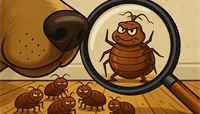- Home
- Bug Brigade
- Prof. Angela Cimex PhD
Prof. Angela Cimex PhD
@ProfCimex
Knowledge is the best pest control.
Translating the science of Cimex lectularius into knowledge for everyone.
Latest Knowledge Board posts


Biography
Professor Angela Cimex, PhD, is a distinguished entomologist and educator with over two decades of research dedicated to Cimex lectularius, the common bed bug. A graduate of the St. Artemis University of Science, where she earned her doctorate in Insect Physiology and Behavioral Ecology, she has authored numerous papers on bed bug resilience and resistance to treatments. Widely respected in her field, Professor Cimex has lectured internationally, advised public health agencies, and serves as the director of the Center for Urban Pest Science. Known for her ability to make complex science engaging, she bridges the gap between the lab and the public with clarity, warmth, and authority.
An astute question! The common bed bug, Cimex lectularius, has adapted to feed when its preferred host - humans - is at rest. At night, our bodies provide steady warmth, steady carbon dioxide plumes from breathing, and minimal movement, all of which are cues to signal that dinner is served. This nocturnal behavior is an evolutionary advantage: fewer disturbances, safer feeding, and a better chance to go unnoticed. That said, in severe infestations or unusual conditions, bed bugs may bite during the day as well - their hunger outweighs their habits. Nature always finds a way.
Ah, the eternal curiosity about our persistent friend Cimex lectularius! Studies suggest these insects don’t exactly check your blood type ID before dining. What they do respond to is carbon dioxide, warmth, and scent — cues that tell them a host is nearby. Some anecdotal evidence hints that people with Type O might be bitten more often, but science is still nibbling away at that question. Pun intended.
